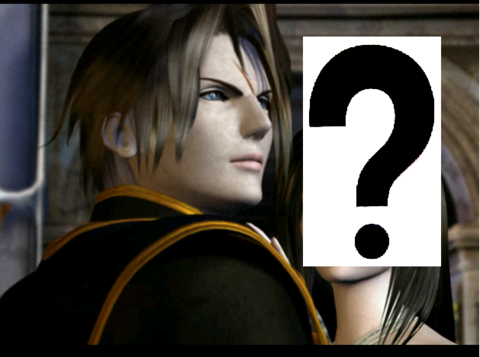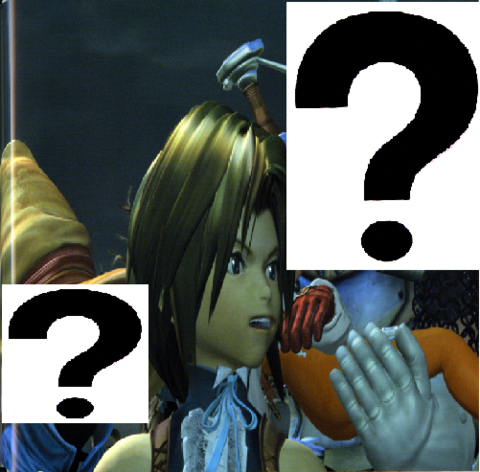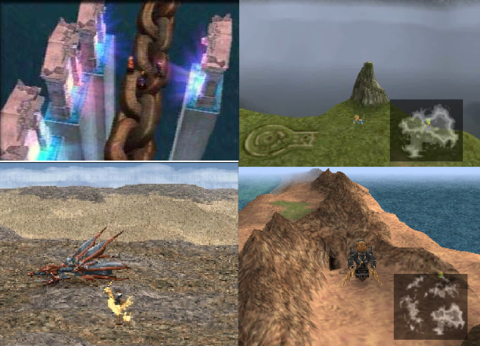Forgetting Where You Came From: Amnesia in FFVIII and IX
By thatpinguino 15 Comments
You can find my followup essay on FFX here!
Amnesia is a gameplay trope with which I am sure we are all familiar. It is a condition which seems to prey largely upon RPG protagonists and supporting characters, and whose cure is lengthy exposition at the game’s climax. The team at Extra Credits has done an excellent job explaining why this story telling cliché seems to infest game narratives like termites in a condemned house. They explain that amnesia allows game writers to tell a story in medias res, meaning that the game’s story begins in the second act of a three-act story arch. The first act of the story is then told later on, either when the main character’s memory is restored or their past is retold. Thus, the trope of amnesia allows the writers to skip straight to the action and backload the backstory, all the while creating an air of mystery about the main character’s murky past. Though Extra Credits’ explanation gives a broad overview of why games would choose to employ the amnesia trope on a mechanical level (skip the explaining, get to the action), it does not cover how amnesia shapes the types of narratives we see in games. That is where I hope to add to the discussion. In this post, I will show how amnesia and imperfect memory play central roles in the narratives of Final Fantasy 8-9. Specifically, I will show how each game uses amnesia and imperfect memory to reframe its narrative in the third act, transforming each narrative from a hero’s triumph over evil, to a son’s struggle to accept and reconnect with his father. In creating two main characters with absentee fathers, each game is able to drastically alter the interpretive context of their main narrative by introducing each character to their father during the final act. By analyzing these two games together, I will show how each game is able to take a bombastic, world-spanning adventure and channel that bombast into a deeply personal tale of self-discovery and family history through the use of amnesia.
Final Fantasy VIII’s cast is downright riddled with forgotten pasts and obscured parentage--as 4 of the game’s 6 playable characters suffer from some degree of amnesia, and 5 of them are orphans. Every SeeD (young mercenaries in the FFVIII world) in the game suffers from long-term amnesia (this horrible epidemic is explained by the game as a side-effect of Guardian Forces, FFVIII’s summoned monsters), and their home, the Garden (a sort of military school), serves as a refuge for orphans. But, regardless of the game’s hokey explanation for its cast’s forgetfulness and orphanage, it is Squall’s fragmented past that the game focuses on. Squall’s childhood is slowly revealed to the player over the course of the game in the form of flashbacks and dialog with his fellow orphans. Though Squall’s past is partially explained and explored throughout the game, it often seems secondary to the more pressing current events that the game presents. Squall’s battle against the sorceress, as well as his budding relationship with Rinoa, seem to be the driving narrative forces in the game and they are certainly the driving forces in the moment to moment gameplay. However, the developers also carefully seeded a parallel narrative in the game: the story of the bumbling Galbadian soldier who would be president, Laguna Loire.
For much of the game, Laguna’s side-story appears to be just that: a side-story. Yet, as Laguna’s adventure progresses, it becomes clear that Laguna is more than a bit player in FFVIII. Before the game’s finale, Kiros (Laguna’s friend) tells Squall, “you look very much like your mother.” Ward (another one of Laguna’s buddies) tells him, “good thing you don’t look like your father,” and Laguna tells him, “let’s talk when this is all done. I have a lot to tell you.” In the least subtle way possible, Laguna, Kiros, and Ward imply that Laguna is Squall’s father in their closing statements. With this one revelation, Squall’s entire story is rewritten. Squall’s relationship with Rinoa changes from a slowly growing teenage romance to the culmination of a generation of unfulfilled love, as Squall is Laguna’s son and Rinoa is the daughter of Julia, Laguna’s first love. Squall’s battle against the sorceress takes on new meaning, as he is the son of the man who defeated Sorceress Adel, the last sorceress threat. Even Squall’s reluctant and improbable leadership is inherited. While his father was a bit of a buffoon forced into leadership by his circumstances and natural charisma, Squall was forced into leadership against his will due to his intelligence and sense of duty. By hiding Squall’s past behind a wall of forgetfulness for the majority of FFVIII, the developers are able to lay the groundwork for Squall’s continuation of his father’s story, without compromising the emotional weight of Squall’s own journey. As a result, the main story of FFVIII is both a pure story of adventure and young love, as well as the story of a young man following in his father’s footsteps; but, it is only at the end of the game that you realize that the romantic narrative is wholly contained in the followed-footsteps narrative. Thus, the entire dual-narrative structure running through FFVIII is a product of its use of amnesia and broken homes.

Now that I have broken down the mechanics of how FFVIII achieves its dual narrative structure through its embrace of the amnesia cliché, the question still lingers: how does this dual narrative effect the way we interpret the game? The game seems to posit, as so many JRPGs do, that fate plays an active role in the lives of humans. Squall seems impelled by some outside force towards leadership and romance. He does little to earn the trust he receives from Cid early in the game, much less earn the trust of his team members, several of whom he seems to treat with active distain (Zell and Irvine especially). He pushes and pushes people away, but it seems like the world insists on elevating him to a position of leadership. However, when Squall’s lineage is brought into focus, his improbable rise to prominence seems almost bequeathed to him by Laguna. In truth, Squall inherited his father’s romantic relationship and his leadership role in the battle against the sorceress. It is as if Squall has subsumed his father’s destiny without inheriting any of the personality traits that made Laguna the man he is. Therefore, the game seems to posit that human life is not merely dictated by personal destiny, but rather that destiny is inherited in the same way eye color and height are inherited. Squall’s whole story arc (and to a lesser extent Rinoa’s story arc) is passed down from father to son despite the fact that Squall grew up an orphan with no knowledge of his father.
Furthermore, Squall begins to emotionally grow beyond his isolated and insular self as he unknwingly follows his father’s lead: he begins to expand to fit the mold into which he has been placed. During his relationship with Rinoa, Squall learns to actually express his emotions to others rather than keep his opinions confined to internal monolog. In his battle with Edea, Squall learns to actually trust his comrades and value their lives as well as his own. In his command of the garden Squall exhibits the leadership qualities that his position demands, rather than simply protesting his appointment. Therefore, as Squall directly follows his father’s footsteps he is able to grow from a naïve adolescent to a full-fledged and, in some ways, remarkable adult.

At the game’s conclusion we are able to see that, while Squall’s story is largely a continuation of his father’s, it is not merely a retelling of an older, greater tale. By the game’s end, Squall has inherited and exceeded the legacy his father passed down. Laguna acknowledges his son’s growth during Squall’s final mission as a SeeD; Laguna briefs his son on the specifics of his final mission to stop Ultimecia and charges Squall with saving the world, as Laguna can no longer do so himself. Laguna literally passes control on to the next generation, as Squall and his friends will determine the fate of the world based on the outcome of their fight against Ultimecia. The game’s final cut-scene further emphasizes this changing of the guard as Laguna’s visit to Raine’s grave is juxtaposed with Squall and Rinoa’s first kiss. Laguna is left reminiscing of the woman he has lost and of the marriage he unknowingly abandoned while Squall’s relationship is only beginning. While Laguna saved the world from Sorceress Adel, Squall has saved all that was and ever will be from Sorceress Ultimecia.
FF VIII posits that one’s future is not only shaped by one’s past: it is dictated by it. Despite Squall’s years in an orphanage, years in the Garden, and years of memory erasure, his journey is still almost entirely plotted by the father he never knew. Though Squall eventually exceeds his father’s lofty achievements, it is difficult to see Squall’s actions as anything but an extension of his father’s. The unseen hand of inheritance guides Squall despite all of the obstacles thrown in its way.
If Final Fantasy VIII is a story about inherited, inescapable destiny, then Final Fantasy IX’s story is quite the opposite. FFIX’s story presents the player with the power of nurture, rather than nature; it is a story that displays how one’s surroundings and upbringing drastically shape one’s fate. FFIX champions the human ability to reject a parent’s wishes in favor of self-determination.
Final Fantasy IX’s cast fares a bit better when it comes to the amnesia bug, only two main characters, Garnet (aka Dagger) and Zidane, suffer from amnesia. Both of these characters are also orphans; however, unlike most of the protagonists of FFVIII, Zidane and Garnet are both adopted at a young age. Garnet is adopted by the royal family of the nation of Alexandria, one of the three major world powers in the world of FFIX. Zidane, on the other hand, is adopted by Baku, the leader of a band of thieves that call the nation of Lindblum their home. For the sake of brevity and focus I will only discuss Zidane’s struggles with orphanage and amnesia.
During his time prior to the events of the game, Zidane constantly ponders the home he cannot remember or find. During a moment of calm in the Black Mage Village, Zidane tells Garnet the story of his childhood,
Once upon a time......there was a man. There was a man who didn't know where he came from... This man had longed to find his birthplace ever since he was a small child. His birthplace. A place he only remembered in his dreams... He wanted to know more about himself, maybe. About his parents, the house where he was born... One day, the man left and went on a quest to find the answer. His only clue was the blue light he saw in his dreams...

Zidane considered his birthplace integral enough to his understanding of self to leave his adoptive family, seeking a place whose only certainty is the color blue. As an orphan, he was unsure how his home and his parents should factor into his life, or if they should even factor in at all. Zidane’s story allows the player to see the hardship of living a life without the context of a past; through Zidane’s eyes the player is allowed to see how critical the traditional ideas of a home and family can seem to someone who has been forced to grow up without either. During his youth it is clear that he initially placed tremendous value on the tangible aspects of a home: a birthplace and parents. He valued those tangible elements of his past to the point of abandoning the only family he had ever known. He did not, at this point, understand that it is an emotional connection between person and place or person and person that instills meaning in the things we call home. He believed that finding the physical point of one’s origin was to find one’s home, and some form of emotional closure that comes with it.
The ending of Zidane’s story at the Black Mage Village illustrates the artificial nature of one’s home. A home is not inherited or immutable; rather one’s home is a symbolic union of the emotional connection one forms with a person or place. Zidane tells Garnet that after his time searching for his home he eventually returned to his adoptive father,
What do you think his father did when he came home… The father raised his fist and beat the son he had worked so hard to raise... The father smiled, after beating up his son! Can you believe that? He just gave his son a beating. But this is what the man thought when he saw his father smile... This is my home. This is the place I call home. The man is still looking for his birthplace. But he already has a home. Maybe...”
The game does not present the player with the loving reunion of a father and his lost son; it instead complicates the relationship that Zidane has with Baku and Tantalus. Baku’s violence is far from the ideal model of fatherhood; yet, in his smile, Baku reveals that the beating he just given his son is out of his anger for his son leaving as well as joy for his son coming back. Baku is not a gentle or a completely honest man, but he is an integral part of Zidane’s home none the less. When Zidane says, “this is the place I call home” he is implicitly restructuring his interpretation of what home is; in this moment Zidane separates the ideas of birthplace and home. He first believed that one’s home was defined by one’s biography: home is where you were born, who gave birth to you. In his new interpretation however, Zidane is the agent creating his own home, home is created when he decides to call a place home. This idea is reinforced by the game’s soundtrack, as the music which plays over the game’s title screen is named “A Place to Call Home.” The concept of finding or creating one’s home is the very theme of the game, both literally as a theme song and figuratively. Though Tantalus would not be considered a family by many and their base might not be a true house, both become a part of Zidane’s home because his attachment to them makes them so.
Although it seems as though Zidane understands his home after his story in the Black Mage Village, he does have another moment of doubt when he returns to his place of birth and meets his “father,” Garland. Much of Zidane’s conception of self and conception of home is predicated on his status as an orphan: he was not born into a home, so he made one with Tantalus; his life was not given a purpose, so he made one, first with Tantalus and then again with the main party of FFIX. Yet, almost immediately upon returning to Terra, Zidane is assaulted with the answers to his lifelong questions: where do I come from and what is my purpose. Garland tells Zidane that his purpose in life was to be an “Angel of Death;” he was meant to be the successor to Kuja, the game’s main antagonist. Zidane was created to enact the exact chaos that he spends the entirety of the game fighting. In Zidane’s return home the developers of the game invert the story of Final Fantasy I; rather than a hero of light prophesied to defeat the dark knight Garland, Zidane is a puppet created by the evil Garland to destroy the world. Final Fantasy IX takes the narrative of the predestined hero and flips it on its head by revealing that the game’s self-made hero was originally a predestined villain. Ultimately, Zidane rejects the destiny that Garland attempts to impose upon him saying,
I wouldn't want that kind of power... if I only had a place to call home... My brothers in Tantalus, Vivi, Freya, Amarant, Quina, Steiner, Eiko, and...Dagger... My home is with them in Gaia! If you say I have a motive, then it's to punish all of you who brought pain to my friends! I'll destroy Terra! That's reason enough for my birth here as a Genome!
In the face of his maker Zidane asserts his own individuality and his own ability to self-determine. Contrary to most Final Fantasy protagonists, Zidane finds his role as a hero because he fervently opposes the powers of fate and destiny, rather than embracing them. FF IX continually emphasizes the authorial role that Zidane take in his own destiny. At seemingly every moment when Zidane can allow the currents of fate to dictate his path he chooses to instead swim upstream.

Though FF VIII and FFIX are sequential games in the Final Fantasy series, their utilization of amnesia and broken homes could not be more diametrically opposed. While one game argues for inescapable destiny in the face of all probability, the other argues for fierce self-determination against all odds. Yet, the tools which each game utilizes to craft their tales are largely the same. Each game obfuscates their leading character’s past only to reveal it towards the end of the game; in both cases the revealing moment completely reorients the main character’s narrative. By saving the moment of reveal for the latter half of each game, the developers allow the player to essentially experience two stories, the pre-reveal story and the post-reveal story. In both cases the pre-reveal story is one of personal growth: Squall learns to accept his friends and express his emotions; Zidane has to be the emotional rock for his party while also learning to manage his newfound feelings for Garnet. These early stories of self-discovery are almost entire stoies unto themselves that end at the moment of revelation. After Laguna is revealed to be Squall’s father, Squall and the party are sent away to the time-compressed world, a place where no towns are enterable and almost no other humans exist. Once Zidane learns of his origins on the planet Terra, the light hearted world of FF IX is covered in a thick mist that turns the world map into eternal night and several visit-able areas are closed forever by gnarled roots. Learning of Squall and Zidane’s past not only changes the player’s interpretation of each character, but it also precipitates a drastic physical change in the playable game world. After each game’s moment of revelation the narrative and the game world itself enter a state of no return for the player. The revelations about the main characters’ pasts are literally game-changing.
While each of these games has a very different understanding of the role of one’s past in determining one’s future, they both seem to agree that one’s past has a profound influence on one’s future, even if that past is entirely unknown. In FF VIII, Squall unknowingly follows his father’s footsteps to their logical (or I suppose illogical) conclusion despite never knowing the man. In this case it seems that Squall’s past has an almost deterministic level of impact on Squall’s life. He unknowingly loves the daughter of his father’s first love and fights the successor to his father’s greatest enemy. Though FF IX envisions a world where Zidane can willingly oppose his creator, he only comes to this decision after unknowingly opposing him for the entire game. Zidane is unwittingly pitted against Kuja for the vast majority of the game, a man who is for all extents and purposes his brother. In fighting against Kuja, Zidane is also acting in direct opposition to his father, Garland, and his homeworld, Terra. On the one hand, personal history seems to act like a phantom string pulling Squall along a preordained path: he is actively opposing the relationships and responsibilities that are thrust upon him, yet he continues down his path in spite of his protests, ultimately arriving right where his father’s path guided him. On the other hand, Zidane is consciously opposing Kuja and in doing so unknowingly making decisions that place him in direct opposition to his father and brother. Once Zidane’s family history is revealed, he chooses to actively continue his defiance. Though Zidane makes a conscious choice to continue opposing his father and brother, he is unkowingly surrounded by the elements of his past for the entire game. Thus, one could argue, that although Zidane is loudly opposing the fate chosen for him by his father, he is still guided by some form of fate or destiny. It is not that Zidane is in complete control of his journey, but rather that the source of his destiny is less directly heretical that Squall’s. Thus, although personal history has a very different role in each game, both agree that personal history has a dramatic impact on who we become as people, even if that history is unknown.
The Final Fantasy series has liberally employed the dual tropes of amnesia and orphanage throughout its history, to the point where almost every game in the series features some combination of the two. Cecil from FFIV; Bartz, Galluf, and Feris from FFV; Terra, Celes, and Gau from FFVI; Cloud from FFVII, Squall, Zell, Irvine, Quistis, and Selphie from FFVIII; Zidane, Garnet, Eiko, and Vivi from FFIX; and there are even more that I haven’t named. These tropes and themes keep recurring precisely because they highlight the quest for identity that these games center upon. Final Fantasy games are highly didactic tales of good versus evil and the maturation of young adults trying to find their place in the world. Thus, amnesia and orphanage act as the ultimate disorientation in a great wide world for the series’ largely young protagonists. They are set adrift from the context of past and family, only to regain that history near the game’s end, thereby symbolically and literally completing their transition to adulthood as they conquer the game’s final challenges.

15 Comments